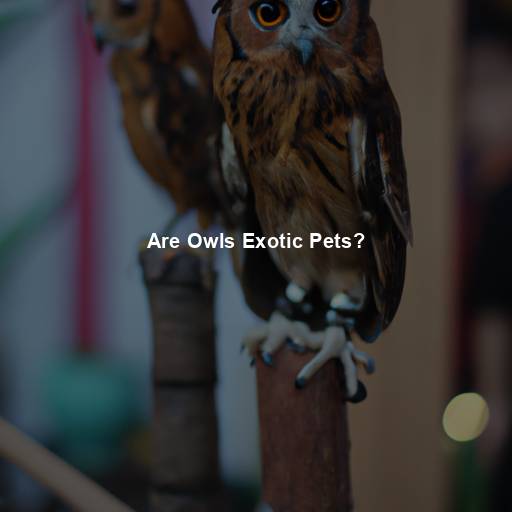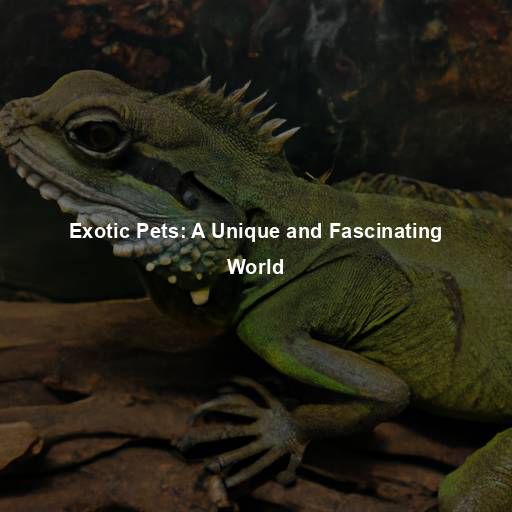Exotic Pets: A Guide to the Legalities and Possibilities in Arizona
Last Updated on November 16, 2023 by Evan
Contents
- 1 Understanding Exotic Pets
- 2 What Defines an Exotic Pet?
- 3 Arizona’s Exotic Pet Laws
- 4 Responsible Exotic Pet Ownership
- 5 Potential Challenges and Considerations
- 6 Alternatives to Exotic Pet Ownership
- 7 The Magic of Exotic Pets
- 8 FAQs: What Exotic Pets are Legal in Arizona
- 8.1 Can I legally own a tiger or lion as a pet in Arizona?
- 8.2 Are venomous or poisonous reptiles allowed as exotic pets in Arizona?
- 8.3 What small exotic pets are legal to own in Arizona?
- 8.4 Can I have a pet monkey in Arizona?
- 8.5 Are there any regulations regarding exotic fish as pets in Arizona?
- 8.6 Can I legally own a pet alligator or crocodile in Arizona?
Understanding Exotic Pets
Owning a pet is a fulfilling experience that brings joy, companionship, and a sense of responsibility. While dogs and cats are the most common choices, some individuals seek a more unique connection with wildlife by opting for exotic pets. These extraordinary creatures can range from reptiles and amphibians to birds and small mammals, offering a captivating glimpse into the diversity of the animal kingdom. However, it is essential to navigate the legalities surrounding exotic pet ownership to ensure the well-being of both the animals and the community.
Exploring the Legal Landscape
When it comes to exotic pet ownership, every state in the United States has its own set of regulations to maintain a balance between animal welfare and public safety. In the sun-soaked state of Arizona, prospective exotic pet owners must familiarize themselves with the specific laws and regulations in place to avoid any legal complications. Understanding the legality of owning an exotic pet in Arizona is crucial to ensure a responsible and harmonious relationship between humans and animals.
What Defines an Exotic Pet?
Before delving into the legality of exotic pet ownership in Arizona, let’s establish what constitutes an exotic pet. Generally, an exotic pet refers to any non-native animal that is kept as a companion animal. These animals often hail from distant lands and possess unique characteristics that captivate enthusiasts. From the colorful plumage of parrots to the slithering grace of snakes, exotic pets can be a source of fascination and intrigue.
Arizona’s Exotic Pet Laws
Understanding the Arizona Revised Statutes
In an effort to protect the harmony between fuzzy companions and local communities, Arizona has enacted the Arizona Revised Statutes (ARS), which constitutes as a finely-tuned regulatory framework for exotic pet ownership. Each provision of these statutes intricately outlines the do’s and don’ts for individuals aspiring to welcome an exotic creature into their lives. To sidestep any legal entanglements and champion responsible guardianship, it is of utmost importance to familiarize oneself with the captivatingly labyrinthine world of the ARS provisions.
Permissible Exotic Pets in Arizona
While some states have stringent restrictions on exotic pet ownership, Arizona offers a relatively lenient environment for enthusiasts. The state allows the ownership of several exotic pets without the need for special permits or licenses. Some examples of permissible exotic pets in Arizona include:
- Ball Pythons – These non-venomous snakes are popular among reptile enthusiasts due to their docile nature and striking patterns.
- Leopard Geckos – With their unique appearance and ease of care, leopard geckos have become a beloved choice for reptile lovers.
Step into the enchanting world of African Pygmy Hedgehogs – these captivating little creatures possess an irresistible charm with their endearing quills and make for delightful companions. Interestingly, these lovable hedgehogs are legal to keep as pets in the state of Arizona, adding to their allure. Discover the joy and wonder of these pint-sized wonders as they weave their way into your heart, leaving you utterly captivated and perplexed by their burst of cuteness. - Sugar Gliders – Known for their gliding abilities and social nature, sugar gliders are legal to own in Arizona when obtained from reputable sources.
Exotic Pets Requiring Permits
Arizona, a state known for its lenient approach to exotic pet ownership, does impose certain restrictions on certain species. These regulations aim to strike a balance between fostering a sense of wonder and adventure and ensuring public safety. Curious creatures such as various reptiles, large cats, and primates fall under the umbrella of animals that demand additional documentation for responsible ownership within the state’s borders.
Are you ready to delve into the mysterious world of venomous snakes? These enigmatic creatures, like the stealthy rattlesnakes or majestic cobras, have captivated human curiosity for centuries. However, it is essential to bear in mind that owning such slithering wonders comes with great responsibility. To guarantee the safety of both the owners and the snakes, a venomous reptile permit is mandatory.
2. Big Cats – The ownership of big cats, including lions, tigers, and leopards, falls under the jurisdiction of the Arizona Game and Fish Department, necessitating a permit and compliance with strict regulations.
3. Crocodilians – Alligators and crocodiles also require a permit due to their potential danger and specialized care requirements.
Prohibited Exotic Pets in Arizona
In a concerted effort to safeguard the harmony between nature and society, Arizona has enforced stringent regulations to deter the possession of certain enigmatic creatures. These extraordinary beings, classified as exotic pets, have been designated as threats due to their inherent danger or their disruptive influence on the delicate balance of local ecosystems. Noteworthy rescinded choices for prospective exotic pet enthusiasts within the state of Arizona encompass an intriguing array of creatures, from the fearsome to the enigmatic.
When it comes to primates, it’s a whole different ball game in Arizona. Owning these magnificent creatures, like monkeys or apes, is completely off the table due to strict regulations. It’s all about protecting their intricate social structures and preserving the delicate balance of their natural habitats. Arizona is leaving no stone unturned when it comes to conservation.
Exploring the enigmatic world of canines, one must tread with caution when it comes to the captivating allure of wolves and their elusive counterparts, wolf hybrids. In the vast desert landscape of Arizona, a mystifying ban has been placed on the ownership of these mesmerizing creatures, inspired by their enigmatic temperament and potential danger they pose to the public. With their untamed nature and uncanny ability to bewitch both the minds and hearts of those who dare to venture into their domain, one must ponder the perplexity that surrounds these captivating creatures.
Discover the enigmatic world of Cougars and Lynx, two mesmerizing feline creatures known for their unrivaled power and grace. While their allure is undeniable, it is essential to remember that these majestic predators are not meant to be domesticated and thus, are strictly off-limits as pets. Unveil the mystique of these wild beauties from afar, respecting their rightful place in the untamed kingdom.
Responsible Exotic Pet Ownership
Understanding the Commitment
Owning an exotic pet comes with a unique set of responsibilities that go beyond those associated with traditional pets. It is crucial to understand the commitment required before embarking on the journey of exotic pet ownership. Factors such as specialized diet, habitat requirements, and socialization needs must be thoroughly researched and understood to ensure the well-being of the animal.
Finding a Reputable Breeder or Rescue Organization
When it comes to bringing an exotic pet into your family, the journey starts with finding a trusted source – be it a reputable breeder or a rescue organization. By choosing ethically obtained animals, you not only safeguard their well-being but also contribute to the larger cause of animal welfare. Moreover, reliable breeders not only provide the required care guidelines but also remain readily available to assist you throughout your ownership journey, ensuring a fulfilling experience for both you and your exotic companion.
Providing a Suitable Environment
Creating a suitable environment for an exotic pet is vital to their overall health and well-being. Researching the specific habitat requirements of the chosen exotic pet is crucial to provide an environment that closely mimics their natural surroundings. This includes temperature control, appropriate lighting, and the provision of proper hiding spots or perches.
Routine Veterinary Care
Just like any other pet, exotic animals require routine veterinary care to monitor their health and address any potential issues. Finding a veterinarian experienced in treating exotic pets is essential to ensure that your pet receives the specialized care they require.
Understanding the Unique Needs
Taking care of an exotic pet is no joke – it’s a whole new level of commitment. These captivating creatures come with their own set of demands and peculiarities that you can’t just wing. So, before you bring home that striking beauty you’ve set your eyes on, make sure you dive deep into the world of research. Understanding their unique habitat, quirky appetite, social dynamics, and even potential ailments will empower you to offer them the top-notch care they deserve.
Consulting Experts and Reputable Sources
When it comes to exotic pet ownership, seeking advice from experts and reputable sources is invaluable. Veterinarians specializing in exotic animals, experienced exotic pet owners, and reputable websites or books can provide valuable insights and guidance. They can help you navigate the complexities of exotic pet care, inform you about potential challenges, and offer tips for creating a suitable environment for your new companion.
Potential Challenges and Considerations
Time and Financial Commitment
Owning an exotic pet requires a significant investment of time and money. These animals often have specialized needs that can be more demanding than those of traditional pets. For example, reptiles may require specific temperature and humidity levels, while birds may need regular social interaction and mental stimulation. Additionally, exotic pets may have longer lifespans than traditional pets, meaning you need to be prepared for a long-term commitment.
Legal Considerations Beyond Arizona
Explore the captivating realm of exotic pet ownership in Arizona, where the legal landscape can be as diverse as the creatures themselves. Unveiling a tapestry of regulations that may weave differently across state lines and even within local communities, this article delves into the perplexing intricacies that enthusiasts must navigate. As you embark on thrilling adventures with your extraordinary companions, remember to embark on thorough research, embracing the legal intricacies of your destination to ensure harmonious coexistence with the law.
Ethical Concerns and Conservation
As we delve into the captivating world of exotic pet ownership, a myriad of ethical concerns and perplexing considerations arise. Within this realm, one cannot help but acknowledge the intricate dance between our desire for unique companionship and the potential repercussions on wildlife conservation efforts. A delicate balance must be struck between the allure of owning these extraordinary creatures and ensuring their populations and ecosystems are not detrimentally impacted. Thus, we must champion and support ethical breeders who place the utmost importance on safeguarding animal welfare and actively contribute to conservation efforts.
Alternatives to Exotic Pet Ownership
Exploring Ethical and Educational Alternatives
If you are interested in experiencing the wonder of exotic animals without owning them, there are alternative ways to satisfy your curiosity and learn more about these incredible creatures. Consider visiting reputable zoos, wildlife sanctuaries, or educational facilities that provide opportunities to observe and interact with exotic animals in a controlled and responsible environment. These institutions often prioritize education, conservation, and the well-being of the animals.
Volunteering and Supporting Conservation Efforts
Getting involved in conservation efforts is a meaningful way to contribute to the welfare of exotic animals. Many organizations offer volunteer programs or opportunities to support their initiatives financially. By dedicating your time or resources, you can make a positive impact on the preservation of exotic species and their habitats.
The Magic of Exotic Pets
The Unique Joys of Exotic Pet Ownership
Despite the challenges and considerations, owning an exotic pet can be an incredibly rewarding experience. These extraordinary creatures have the ability to captivate our hearts and provide us with a deeper connection to the natural world. The bond between an exotic pet and their owner can be profound, filled with moments of awe, joy, and companionship that are truly unforgettable.
Promoting Responsible Ownership
As exotic pet enthusiasts, it is our responsibility to promote responsible ownership practices within our community. By sharing knowledge, offering support, and advocating for the welfare of these animals, we can ensure that exotic pets receive the care they deserve. Responsible ownership not only benefits the animals themselves but also fosters a positive perception of exotic pet enthusiasts and helps maintain the legality and sustainability of exotic pet ownership.
FAQs: What Exotic Pets are Legal in Arizona
Can I legally own a tiger or lion as a pet in Arizona?
Oh, the wild allure of having a majestic tiger or regal lion as a pet! Despite the temptation, Arizona has firmly put its foot down on this captivating idea. The possession of big cats, including the likes of tigers, lions, leopards, and jaguars, is downright illegal in the state. The authorities have enforced this law to ensure the well-being of these magnificent creatures, whose care demands expert knowledge and specialized facilities found only in professional wildlife establishments, zoos, and sanctuaries. So, unfortunately, we must tame our dreams and leave the wild in the hands of those equipped to handle it.
Are venomous or poisonous reptiles allowed as exotic pets in Arizona?
Owning venomous reptiles, like rattlesnakes, or any other poisonous reptiles as pets in Arizona is strictly forbidden unless you have the necessary permit. The regulations in place exist to protect the public from potential harm. However, individuals working with these animals for scientific, educational, or exhibition purposes can obtain specialized permits to do so.
What small exotic pets are legal to own in Arizona?
Arizona allows the ownership of various small exotic pets without restrictions. Some examples include non-venomous snakes like corn snakes and ball pythons, small mammals like ferrets, chinchillas, and hedgehogs, as well as birds like parrots, cockatiels, and finches. However, it is always important to research and ensure you meet all the necessary requirements, such as obtaining permits or complying with local regulations if applicable.
Can I have a pet monkey in Arizona?
Ownership of primates, including monkeys, is regulated in Arizona. In most cases, it is illegal to own a primate as a pet without obtaining a proper permit. Primates can be difficult to care for as pets due to their complex social and environmental needs, potential aggression, and long lifespans. It is essential to thoroughly research primate ownership and consult with relevant authorities before considering owning one as a pet in Arizona.
Are there any regulations regarding exotic fish as pets in Arizona?
In Arizona, the world of exotic fish as pets is an enigmatic realm where rules seem to dissipate like water. While there are no concrete regulations or permits governing their presence, navigating this aquatic wonderland demands a delicate balance between curiosity and caution. One must embark on a quest to ascertain whether their desired fish species are barred from their new home due to their invasive nature, a puzzling mystery that leaves owners in a state of perplexity. As waves of intrigue crash over aspiring fish enthusiasts, it is integral to seek guidance from local regulations or embrace the solace of seasoned aquarium enthusiasts, splendidly versed in the enigmatic art of piscine companionship.
Can I legally own a pet alligator or crocodile in Arizona?
It’s no secret that having an alligator or crocodile as a pet in Arizona is quite an elusive and exclusive ordeal. With their potential for colossal growth and unique care requirements, these scaly companions require an immense amount of expertise and suitable facilities to thrive. Obtaining permits for these reptiles is like finding a needle in a haystack; they are mostly reserved for educational institutions, scientific endeavors, or established zoos rather than individuals seeking private ownership. So, if you’ve been daydreaming of having a toothy reptilian friend, you may want to consider alternative companionship options within the confines of Arizona’s regulations.







